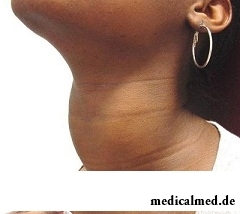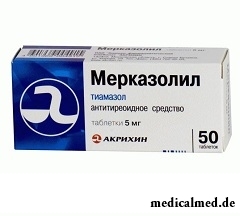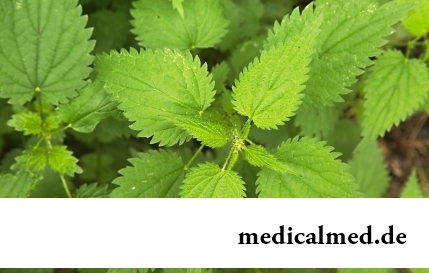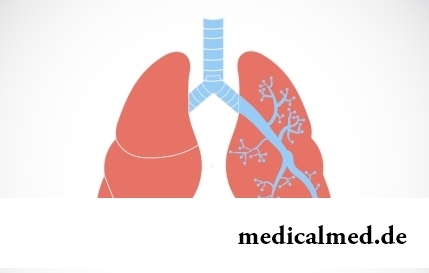





Thyrotoxicosis
Thyrotoxicosis – the morbid condition caused by the increased level of the hormones (triiodothyronine, thyroxine) of a thyroid gland provoking organism intoxication. For designation of this state the term a hyperthyroidism is also used.
Thyrotoxicosis: general information about a disease
At hyperfunction of a thyroid gland thyroid hormones come to blood and body tissues much that leads to dissociation of fabric and oxidizing phosphorylation. The thyrotoxicosis inevitably leads to disturbance of energy balances in an organism. In an organism excess formation of heat results, the amount of the energy accumulated by ATP decreases. Completion of energy happens due to acceleration of all metabolic processes in an organism.
Excess of thyroid hormones in an organism leads to disturbance of many processes, exerting impact on a condition of a nervous system, function of heart, visual function, functions of a musculoskeletal system, a GIT, a reproductive system. It is necessary that dysfunctions of a thyroid gland do not lead to serious consequences at adequate medicamentous correction of a state. In the absence of appropriate treatment of a thyrotoxicosis the following complications can develop:
- Infiltrative ophthalmopathy;
- Heart failure;
- Various forms of arrhythmias;
- Thyrocardiac crisis – serious condition at which the avalanche are observed increase of manifestations, the concentration of thyroid hormones caused by sharp increases in blood.
Depending on the level of emergence and development of disturbance allocate a thyrotoxicosis of the following types:
- Primary – disturbance develops in a thyroid gland;
- Secondary – disturbance develops in a hypophysis;
- Tertiary – disturbance arises in a hypothalamus.
Major factors of risk of development of a thyrotoxicosis in an organism:
- The burdened family anamnesis;
- Sex;
- Chronic deficit of consumption of iodine with food;
- Autoimmune diseases;
- Chronic forms of a stress.
The course of a thyrotoxicosis is characterized by sexual and age factors. At men at a thyrotoxicosis development of an infiltrative ophthalmopathy is more often observed, at advanced age the thyrotoxicosis is followed by disturbance of a cordial rhythm, characteristic changes of mentality more often. At children's age the hyperthyroidism is characterized by neurotic manifestations.
Thyrotoxicosis: reasons of development of a disease
At a thyrotoxicosis can be the reasons of development of dysfunction of a thyroid gland:
- Toxic diffusion craw, also Bazedov's disease – the autoimmune disease which is the most frequent reason of a thyrotoxicosis;
- Toxic nodal craw or toxic adenoma of a thyroid gland (Plummer's disease) – the high-quality new growth which is independently producing thyroid hormones;
- Subacute thyroiditis – a diffusion or focal inflammation of a thyroid gland;
- Uncontrolled administration of drugs, containing thyroid hormones;
- Excess contents or consumption by an iodine organism;
- Teratomas of ovaries – special type of the tumoral new growths created by gonocytes;
- Hypophysis tumors with hypersecretion of thyritropic hormone.
At a thyrotoxicosis of the reason of development of disturbance are extremely important as treatment of a state has to be directed not only to normalization of level of hormones in an organism, but also on elimination of the reason of a producing a thyroid gland of hormones there is a lot of. For establishment of the reasons of development of a hyperthyroidism the patient needs comprehensive examination. At a thyrotoxicosis of a cause of infringement of function of a thyroid gland cause tactics of treatment and prevention of the subsequent recurrence.
Thyrotoxicosis: disease symptoms
Depending on expressiveness of a symptomatic complex the thyrotoxicosis is characterized by easy, average and heavy forms. At a thyrotoxicosis can be the symptoms indicating dysfunction of a thyroid gland:
- The sharp loss in weight at not changed diet and a diet which is followed by good appetite;
- Fever, heat, feeling of difference of temperatures in a body;
- Decrease in a sexual inclination;
- Disturbance of menstrual cycles at women up to complete cessation of periodic bleedings;
- The disturbance of a cordial rhythm which is shown a cardiopalmus at rest;
- Tremor, shiver in extremities;
- The increased sweating;
- Concern, restlessness, sleep disorder (from sleeplessness to the increased drowsiness);
- The disorders of a GIT which are shown vomiting, frequent diarrheas and locks;
- Bystry fatigue, depression, stress, psychological fatigue;
- Disturbance of memory, concentration of attention;
- Disturbance of visual function, development pucheglaziya.
At a thyrotoxicosis at the patient the usual rhythm of life is broken. There are symptoms of the increased fatigue even after the long period of rest, emotional instability, develops tearfulness, concerns. The person is overcome by new phobias, owing to disturbance of metabolism anorexia is quite often observed. At a thyrotoxicosis symptoms can be also shown in the form of muscular weakness (a thyrocardiac myopathy). The general exhaustion of an organism develops. At inappropriate treatment or lack of treatment at all the thyrotoxicosis can lead to a lethal outcome.
Thyrotoxicosis: treatment, recommendations of doctors
At a thyrotoxicosis treatment assumes an integrated approach, considering the disturbance development reasons, a symptomatic complex, the general condition of the patient. Treatment has to be done at the same time at several levels: along with correction of a hormonal background, elimination of the reasons of development of hormonal intoxication, the patient has to receive fortifying therapy.
At a thyrotoxicosis treatment assumes:
- Conservative techniques of treatment of a thyrotoxicosis – conservative techniques are the cornerstone the thyreostatic drugs used for suppression of hyperfunction of a thyroid gland. Medicamentous therapy demands special accuracy in drug intake in order to avoid a recurrence. Medicamentous therapy allows to normalize functions of a hypothalamus, TsNS or to compensate them;
- Radical techniques assume surgical intervention. At a thyrotoxicosis treatment by radical methods is applied at inefficiency of medicamentous correction, suspicions on malignant new growths, at a retrosternal arrangement of a craw, at significant increase in a thyroid gland;
- The radioactive method assumes administration of drugs, containing a radioiodine. At a thyrotoxicosis treatment by a radioiodine is effective and safe. Iodine collects in cells of a thyroid gland that leads to their death and substitution by connecting fabric. The technique allows to reduce manifestation of a symptomatic complex quickly. The main risk at treatment by a radioiodine is full suppression of function of a thyroid gland that demands lifelong replacement hormonal therapy.
In the aspiration to pull out the patient, doctors often go too far. So, for example, a certain Charles Janszen during the period from 1954 to 1994 endured more than 900 operations on removal of new growths.

The climax, or menopause is the normal process of the termination of genital function of the woman which is followed serious hormonal...
Section: Articles about health
About 10-15 years ago existence of the computer in the apartment of the Russian was considered as a rarity and office rooms were only at the first stage of equipment by these useful devices. Today practically in each house there is a computer (and often not one), and to constants...
Section: Articles about health
The problem of diagnosis was and remains to one of the most important in medicine. From that, the reason of an indisposition of the patient will be how precisely defined, eventually success of treatment depends. In spite of the fact that the majority of the diagnostic methods applied in official clinical practice has very high informational content and reliability, mistakes directed by diagnoses nevertheless are not excluded....
Section: Articles about health
It is known that the person for 80% consists of water which participates in all processes of an organism. The person loses liquid daily – in...
Section: Articles about health
Hemorrhoids – extremely widespread disease. Periodically arising inflammations and bleeding of hemorrhoidal nodes cause serious discomfort to nearly fifteen percent of adults. Meanwhile, having a clear idea of the aggravation reasons...
Section: Articles about health
At this plant there are a lot of names: tuberiferous sunflower, Jerusalem artichoke, solar root, earth pear. Contrary to popular belief, it is not an exotic plant at all. The wild girasol grows in a midland of Russia practically everywhere: at the edges of roads, to slopes of ravines, on heathlands. Also several cultural versions different from wild plants are removed by larger and juicy root crops....
Section: Articles about health
You heard that laughter prolongs life? To establish longevity direct link with sincere fun to researchers yet not удалос...
Section: Articles about health
The kid who was recently born is surrounded with love of adult family members and their cares without which the baby cannot exist. Some parents consider that gentle attachment and caress are quite enough that the child correctly developed and was happy...
Section: Articles about health
Scientists have no unambiguous opinion on a proximate cause of emergence of a carcinoma cutaneum today. Only the factors promoting development of this illness are precisely established. Treat them: long impact on skin of ultraviolet rays, radiation exposure, thermal injuries, injuries of skin by aggressive chemicals (pitches, acids, alkalis, etc.), genetic predisposition (existence of malignant new growths of skin in the family anamnesis), at...
Section: Articles about health
History of cultivation of a buckwheat contains more than five thousand years. Grain which is received from this plant is used for пригото...
Section: Articles about health
What is in our understanding weeds? It plants which are considered to be suitable only for compost pits and feeding of animals. Meanwhile, among the weeds growing literally under legs it is possible to find the mass of the officinal herbs possessing invaluable Paul...
Section: Articles about health
Each failure in work of bodies and systems of a human body is, as a rule, shown by the whole complex of symptoms. In particular, malfunctions with health often cause emergence of cosmetic defects in the form of rashes on a face. Experienced doctors know that localization of heat-spots usually depends on what disease the patient has....
Section: Articles about health
Household skills which to us so diligently imparted in the childhood it appears, not always bring only benefit. According to result...
Section: Articles about health
Weakness of an ankle joint – very widespread problem. Its existence is demonstrated by tendency to a podvorachivaniye of legs when walking on heels, frequent painful sprains, pain on average and anonymous toes even after small nagruzo...
Section: Articles about health
The thought that the mass of their body is too big at least once in life visits from 80 to 95% of women. Many women are so obsessed with this idea that constantly try all new and new ways of weight reduction. A considerable part of these techniques is ineffective, and some in general are unsafe for health....
Section: Articles about health
So, you resolved to lose weight. And now you try to understand what to begin with: from exercise stresses or a diet? And how to make, h...
Section: Slideshow
Heart disease and blood vessels lead to disturbance of blood supply of bodies and fabrics that involves failures in their work, deterioration in health of the person, decrease in its working capacity and standard of living. Annually such perishes from pathologies more...
Section: Articles about health
Cellulitis - very widespread cosmetic shortcoming which arises approximately at 80% of women sooner or later. Emergence it is connected with change of structure of a hypodermic fatty layer. At the same time on the surface of skin at first there are roughnesses (cambers and cavities), and then small consolidations, the so-called effect of an orange-peel is shown. Changes in a condition of hypodermic cellulose are a consequence of a hormonal imbalance in an organism....
Section: Articles about health
It is possible to find the extensive range of fruit and vegetables in modern shops. Russians already got used that on counters in any...
Section: Articles about health
The trophic ulcer is not an independent disease. This heavy complication arising owing to a thermal injury (a burn or a frostbite), chronic pathologies of arteries or veins of the lower extremities, a diabetes mellitus, and also some defeats of a soyeda...
Section: Articles about health
The unpleasant feelings connected with spring breakdown are familiar almost to each of us. Often happens that in March-April on the person weakness leans: he suffers from drowsiness, complains of bad mood, loss of interest in life and failures in affairs....
Section: Articles about health
Life activity of one-celled fungi of the sort Candida is a proximate cause of development of candidiasis (milkwoman), it is related...
Section: Articles about health
Color of plants is caused by presence at them of certain chemical compounds. Let's talk about what is meant by various colors of vegetables and fruit and what properties they give them....
Section: Articles about health
Eyes – unique body on the structure thanks to which the person obtains about 80% of information on the world around: about a form, color, size, the movement, and also many other parameters of objects or phenomena. But whether much we know about the most valuable sense body which, according to the scientist Sechenov, provides us about one thousand various feelings a minute? Let's consider 10 most surprising facts about eyes and sight....
Section: Articles about health
They say that to ensure health and longevity of people it is obliged. Really, at competent approach to these questions, we will pass...
Section: Articles about health
Work of a brain is extremely complex and in many respects is not studied yet. It is confirmed also by the features of thought processes which are shown when the person sleeps. Let's tell about some of them....
Section: Articles about health
Subfebrile temperature call fervescence to 38 degrees, and subfebrile condition - existence of such temperature over 3 days, and quite often it happens without the visible reasons. Existence of subfebrile condition - a strong indication of disturbances in an organism which can be caused by various reasons: disease, stresses, hormonal failures. Despite the seeming inoffensiveness it is a state at which people often continue to lead a usual life, often is a sign of many of a zabolev...
Section: Articles about health
